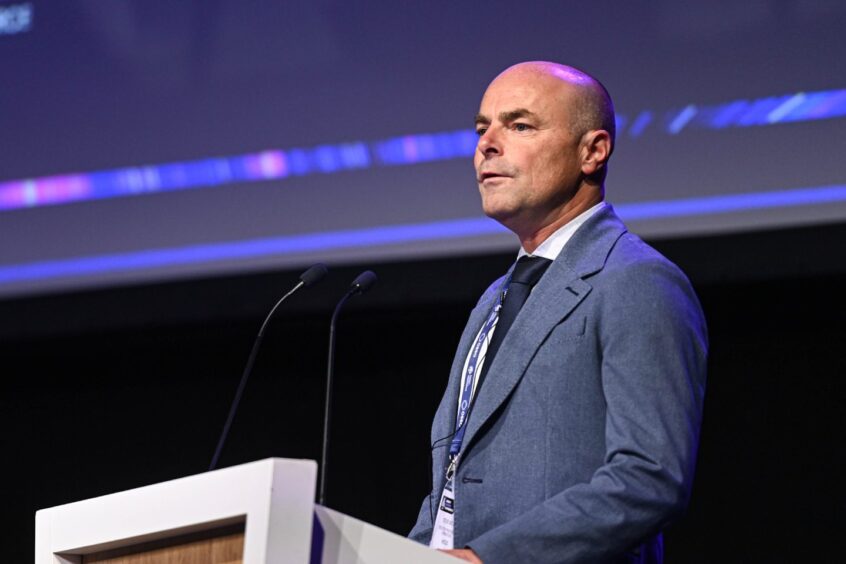
As Sian Lloyd Rees’s time as the UK’s supply chain champion comes to an end, she recommends that the government sets up a £150 million funding pot.
As energy minister Michael Shanks visits Aberdeen today, Rees will recommend that Labour’s government should set aside £50m for the pot with developers and supply chain matching the funding.
Steve Nicol, board member of trade body Offshore Energies UK (OEUK) and executive president of operations at Wood, will be taking over as the UK’s supply chain champion following Rees’s tenure.
This comes a day after OEUK sent a letter to the government, which was signed by 42 supply chain companies, that warned of job losses and declining investment.
The outgoing supply chain champion argued that that funding pot will support firms that work in the oil sector to “pivot” to new solutions that can support the UK’s net zero journey.
Rees outlined: “The fund is spread over five years, commencing in 2024, and should include a tailored mix of grants, low interest loans or equity investments for maximum flexibility.”
The plan is to streamline and simplify funding opportunities for supply chain firms by changing how existing measures are implemented.
She said that this move would repurpose funds sent to the Green Industries Growth Accelerator as well as research and development and simplify the access to cash for the firms that need it.
Rees, non-executive director of Serica Energy, said: “Priority allocation should be given to companies and consortiums with existing UK strength and a significant addressable market potential.”
SME inclusion and jobs based in the UK for a minimum 5-year period would be conditions of award, under the supply chain champion’s proposals.
“Prioritisation based on market potential and UK strength will attract further inward investment,” she said.
Under these plans, Rees sees a future in which the UK “seizes £1 trillion addressable market in renewable and low carbon technologies.”
The call for the £150m investment post came as OEUK published a supply chain report that found “by 2026 the UK will spend more on offshore renewable energy sources than on oil and gas.”
It argued that “the supply chain will need to adapt, maintain and renew skills, which is a challenge when operating in a rapidly declining UK sector with predominantly low-margin, operational spending.”
Wood boss takes up supply chain champion role
Sian Lloyd Rees was appointed Oil and Gas Supply Chain Champion in 2021.
On her last day as supply chain champion, Rees said: “Building on the highly relevant solutions developed for the oil and gas sector will enable us to make faster progress towards the UK’s clean energy ambition.
“Equally important is the proven credibility of this industrial strength in globally competitive markets”.
The role was established as a key deliverable of the North Sea Transition Deal signed between industry and government that year.
Nicol has worked for the Aberdeen headquartered engineering firm Wood for over 22 years having started out as a project accountant.
Ahead of his most recent role with the firm we held the position of deputy chief financial officer for just over a year.
Upon becoming UK supply chain champion, Nicol said: “People, skills and a robust supply chain are not only vital to the safe delivery of energy today, but for our future net zero ambitions.
“The supply chain must be able to expand and grow, and we need an attractive business environment that stimulates investment, enables new technology and champions the people who have the skills to deliver the transition.”
Nicol will support Offshore Energies UK (OEUK) in its work across industry, governments, and regulators to build, enable, grow and sustain the UK’s offshore energy supply chain.
David Whitehouse, CEO of OEUK offered his thanks to Sian Lloyd Rees for her work as supply chain champion and welcomed Nicol to the role.
He said: “With a heritage in oil and gas and a growing rich expertise across offshore energies, supply chain companies and the tens of thousands of jobs they support have the potential to be the lifeblood of a homegrown energy transition. We must protect this expertise and harness it.
“We must build on our industrial strengths, and we do that through working in partnership across sectors and with governments. Creating new opportunities for people and the economy starts with unlocking investment into our offshore energy supply chain and the time to act is now.”

 © DARRELL BENNS / DC THOMSON
© DARRELL BENNS / DC THOMSON